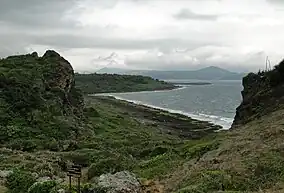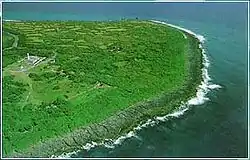Kenting National Park
Kenting National Park (Chinese: 墾丁國家公園; pinyin: Kěndīng Gúojiā Gōngyuán), commonly known as Kenting (Chinese: 墾丁; pinyin: Kěndīng), is a national park located on the Hengchun Peninsula of Pingtung County, Taiwan, covering Hengchun, Checheng, and Manzhou Townships. Established on 1 January 1984,[1] it is Taiwan's oldest and the southernmost national park on the main island, covering the southernmost area of the Taiwan island along Bashi Channel. Administered by the Executive Yuan's Ministry of the Interior, this national park is well known for its tropical climate and sunshine, scenic mountain and beach, the Spring Scream rock-band festival held in every March,[2] and has long been one of the most popular tourist destinations in Taiwan with 5.84 million visitors in 2016.[3]
| Kenting National Park | |
|---|---|
 Cape Maobitou in Kenting National Park | |
 Location of Kenting National Park in Taiwan | |
| Location | Taiwan |
| Nearest city | Hengchun |
| Coordinates | 21.98°N 120.797°E |
| Area | 333 km2 (129 sq mi) |
| Established | 1 January 1984 |
| Visitors | 8,376,708 (in 2014) |
| Governing body | Kenting National Park Administration Office |
| www | |
| Kenting National Park | |||||||||||||
|---|---|---|---|---|---|---|---|---|---|---|---|---|---|
| Traditional Chinese | 墾丁國家公園 | ||||||||||||
| Simplified Chinese | 垦丁国家公园 | ||||||||||||
| |||||||||||||
Etymology
Kenting (墾丁, Kun-ting in Taiwanese) means pathfinders or pioneers.
Geography
The park covers about 181 square kilometres (70 sq mi) of land, 152 square kilometres (59 sq mi) of sea, weighing in at 333 square kilometres (129 sq mi) combined. Nan Wan and Banana Bay (香蕉灣) is surrounded by the Pacific Ocean, the Taiwan Strait, and the Luzon Strait. The park is 90 kilometres (56 mi) away from Kaohsiung, 140 kilometres (87 mi) away from Tainan.
The landscape boasted by Kenting National Park is divided into two parts by the long and narrow Hengchun Longitudinal Valley Plain that extends from north to south. With coral sea cliffs teemed with fringing reefs along the west coast, the park features a large number of mountains in the north, and coral tablelands and foothills in the south. The plain, which is formed by fault valleys, has a vast lake called Longluan Lake, together with rising coral tablelands and limestone caves to the east. The east side of the coral tablelands features unique sand rivers and sand waterfalls formed by the combined effects of winds and rivers, as well as coral cliffs, sunken caves and stalactites.
Climate
Kenting is known for its tropical climate with warm to hot weather year-round. Along with the rest of Pingtung, the climate is geographically classified as a tropical monsoon climate.
| Climate data for Kenting National Park | |||||||||||||
|---|---|---|---|---|---|---|---|---|---|---|---|---|---|
| Month | Jan | Feb | Mar | Apr | May | Jun | Jul | Aug | Sep | Oct | Nov | Dec | Year |
| Average high °C (°F) | 26.1 (79.0) |
26.7 (80.1) |
27.5 (81.5) |
29.5 (85.1) |
31.0 (87.8) |
31.5 (88.7) |
32.0 (89.6) |
31.7 (89.1) |
31.1 (88.0) |
29.8 (85.6) |
27.6 (81.7) |
27.0 (80.6) |
29.3 (84.7) |
| Daily mean °C (°F) | 21.5 (70.7) |
22.0 (71.6) |
23.8 (74.8) |
25.8 (78.4) |
27.5 (81.5) |
28.4 (83.1) |
28.7 (83.7) |
28.4 (83.1) |
27.8 (82.0) |
26.7 (80.1) |
24.8 (76.6) |
22.3 (72.1) |
25.6 (78.1) |
| Average low °C (°F) | 19.8 (67.6) |
20.5 (68.9) |
21.2 (70.2) |
22.3 (72.1) |
24.1 (75.4) |
25.3 (77.5) |
25.6 (78.1) |
25.3 (77.5) |
24.7 (76.5) |
23.9 (75.0) |
22.0 (71.6) |
21.3 (70.3) |
22.5 (72.5) |
| Average rainfall mm (inches) | 25.7 (1.01) |
27.7 (1.09) |
19.9 (0.78) |
43.5 (1.71) |
163.9 (6.45) |
371.3 (14.62) |
396.3 (15.60) |
475.2 (18.71) |
288.3 (11.35) |
141.8 (5.58) |
43.2 (1.70) |
20.6 (0.81) |
2,017.4 (79.43) |
| Average rainy days (≥ 0.1 mm) | 8.0 | 6.8 | 4.8 | 6.3 | 11.1 | 16.9 | 16.4 | 18.9 | 15.9 | 10.8 | 7.1 | 6.1 | 129.1 |
| Average relative humidity (%) | 72.6 | 73.7 | 74.4 | 75.4 | 78.5 | 83.6 | 83.3 | 84.0 | 79.7 | 74.0 | 70.8 | 70.7 | 76.7 |
| Mean monthly sunshine hours | 168.0 | 165.1 | 199.7 | 192.6 | 193.9 | 183.6 | 221.0 | 195.5 | 177.2 | 198.1 | 177.7 | 161.4 | 2,233.8 |
| Source: Central Weather Bureau[4] | |||||||||||||
Biodiversity
The park hosts rich terrestrial biodiversity of fauna and flora including 15 species of mammals, 310 species of birds, 59 species of reptiles and amphibians, 21 species of freshwater fish, 216 species of butterflies, and various insects.[5]
Eluanbi Park or Oluanpi Park (鹅鑾鼻公園) is located at Cape Eluanbi.[6] Nature reserves such as the Longkeng Ecological Protection Area (龍坑生態保護區)[7] protecting coral reefs and virgin forest of Banana Bay and Hengchun Peninsula.[8] 26 species of land crabs inhabit in the area and which is the highest diversity of terrestrial crabs in single areas in the world.[9] 34 species of terrestrial mammals including 5 locally extinct such as Formosan clouded leopard, and 4 introduced such as water buffalo, have been recorded.[10] Formosan sika deer which became extinct in wild in 1969, was first reintroduced into Kenting National Park in 1994.[11] Aside from sika deer, 6 species of terrestrial mammals were once thought to be extinct in the area, while critically endangered Chinese pangolin were rediscovered a decade after.[12]
Ocean current which flows off the park provides rich diversities of marine ecosystems including sea birds, sea turtles including critically endangered hawksbill turtles,[13] sharks such as bull sharks[14]manta-rays, and whale sharks,[15][16] and smaller to medium-sized cetaceans.[17][18][19][20] The area was once a major wintering ground for sperm and baleen whales[21] especially humpback whales that migrated into Nan Wan and Banana Bay.[22] Japanese whaling during Japanese colonial days,[15][23][24] led to severe depletions or disappearances of whales in consequence. Today, no or very few whales may constantly migrate along Hengchun Peninsula and into the park's waters.[25][26][27] Dugongs, thought to be either fully or functionally extinct in Taiwan, were reported in the 1950s and 60s, and these were some of the last report of the species in Taiwanese waters.[28]
The national park is an important stopover on the migration path of the gray-faced buzzard.[29]
Lighthouse

Eluanbi Lighthouse was completed in 1883, following requests from the American and Japanese governments to the Chinese government after several shipwrecks occurred in the 1860s (including the Rover incident). Chinese troops had to be sent to protect the lighthouse during construction from attacks by local tribesmen, and the lighthouse was surrounded by a fort with cannons and a ditch for protection.[30] It is one of the rare examples in the world of a fortified lighthouse. The lighthouse itself is 21.4 metres (70 ft) high and its light is 56.4 metres (185 ft) above the tidal high water. The light flashes every 10 seconds and its range is 27.2 nautical miles (50.4 km).
Transportation
- Bus: Frequent buses link this park with Kaohsiung International Airport, Taiwan Railway Administration's Kaohsiung Station and the Taiwan High Speed Rail Zuoying Station, a journey of 2.5 hours.
- Air: This park is served by the domestic Hengchun Airport although flights are rare and are subject to cancellation due to the strong Katabatic wind which is frequent in the Hengchun Peninsula.
In popular culture
- Spring Scream: A well-known international rock-band festival held inside this park since 1995.
- Most parts of the 2008 film Cape No. 7 were filmed inside this park, and nearby Hengchun.
- Part of the 2012 film Life of Pi was filmed inside the park, which is not far from its director Ang Lee's birth place.[31][32]
Gallery
 Beach view from Kenting beach
Beach view from Kenting beach Another beach in Kenting, Baishawan, White Sand beach
Another beach in Kenting, Baishawan, White Sand beach Jialeshui beach in Kenting, the surfer beach
Jialeshui beach in Kenting, the surfer beach East Coast in Kenting National Park
East Coast in Kenting National Park



References
- Collins, N. Mark (1991). The Conservation Atlas of Tropical Forests: Asia and the Pacifics. Springer. p. 123. ISBN 9781349120307.
- "www.springscream.com". www.springscream.com.
- Matthew Strong (2017-04-08). "Kenting is Taiwan's most popular national park". Taiwan News. Retrieved 2017-04-08.
- "Climate". Central Weather Bureau.
- "3.3 Wildlife-Ecology-Kenting National Park". Archived from the original on June 25, 2016.
- "Entrance fee to Eluanbi Park to be increased in 2016 - Focus Taiwan". focustaiwan.tw.
- Kenting, 悠遊墾丁. "悠遊墾丁旅遊網 Kenting Vacation , Travel Guide ". 悠遊墾丁 Kenting.
- Kenting, 悠遊墾丁. "墾丁民宿 - 包棟、Villa泳池、面海、寵物友好、可烤肉民宿一覽". 悠遊墾丁 Kenting.
- "椰子蟹的Party". 我們的島. February 25, 2013.
- 墾丁國家公園陸域野生哺乳類動物調查研究(第三年)
- 墾丁社頂生態遊 梅花鹿見客 | 台灣環境資訊協會-環境資訊中心. E-info.org.tw (2010-06-30). Retrieved on 2020-12-09.
- 10年來首見!野生穿山甲於墾丁現蹤跡
- "Kenting National Park HQ releases a green turtle into the wild". Archived from the original on June 25, 2016.
- "戲水要當心!兇猛公牛鯊 出沒恆春海域 - 焦點 - 自由時報電子報". 自由電子報. July 9, 2010.
- "| 蘋果新聞網 | 蘋果日報". 蘋果新聞網.
- "2度擱淺 粗魯野放 海生館「害死鯨鯊」". 蘋果新聞網.
- "墾丁國家公園海域哺乳類動物相調查" (PDF). Archived from the original (PDF) on 2016-04-05. Retrieved 2016-03-23.
- "墾丁國家公園鄰近海域鯨豚類生物調查研究" (PDF). Archived from the original (PDF) on 2016-04-05. Retrieved 2016-03-23.
- "海域哺乳類動物相調查 - 墾丁國家公園". Archived from the original on 2020-06-24. Retrieved 2016-03-23.
- 2017, 墾丁後壁湖 海豚跳躍引尖叫聲
- "墾丁國家公園-生物資料庫查詢". bio.ktnp.gov.tw.
- Acebes V.M.J., 2009, A history of Whaling in Philippines, Historical Perspectives of Fisheries Exploitation in the Indo-Pacific, Asia Research Centre, Murdoch University
- "【鯨彩一生】鯨生鯨逝:台灣的捕鯨歷史". 台灣環境資訊協會-環境資訊中心.
- "海中鯨靈". whaleanddolphin.lym.gov.tw.
- "鯨魚噴水奇景 墾丁民眾驚嘆". 華視新聞網.
- "恆春鯨魚噴水! 萬里桐居民驚喜 - 地方 - 自由時報電子報". 自由電子報. January 9, 2015.
- 2017, 稀客大翅鯨現身墾丁外海 遺憾是鯨屍
- Dugong - Status Report and Action Plans for Countries and Territories
- Wang, Flor; Chih-hsuan, Kuo. "Record-high gray-faced buzzards seen in Kenting in annual migration". focustaiwan.tw. Focus Taiwan. Retrieved 21 October 2021.
- Chanson, H. (2007). Coastal Observations: Erluanbi, Southern Taiwan. Shore & Beach, Vol. 75, No. 2, pp. 36-39 (ISSN 0037-4237).
- "李安30億打造《奇幻漂流》 掐預算導演兼伙夫". appledaily.com.tw. November 20, 2012. Archived from the original on November 29, 2012. Retrieved December 26, 2012.
- "Ang Lee begins shooting in Pondy, Life of Pi' comes alive". The Times of India. January 19, 2012. Archived from the original on May 31, 2013. Retrieved November 20, 2012.
External links
- Official website (in English)
- UU Kenting Archived 2014-02-26 at the Wayback Machine (in Chinese)
- Kenting National Park on Taiwan Mag Archived 2010-10-26 at the Wayback Machine (in French)
- Kenting Weekend CondeNast Traveler Mag (in English)
- Coastal Observations: Erluanbi, Southern Taiwan in Shore & Beach, Vol. 75, No. 2, pp. 36–39 (ISSN 0037-4237)
- Mount Dejian, Kenting, Pintung County, South Coast of Taiwan, Coastal Photograph by Hubert Chanson in Journal of Coastal Research, Vol. 25, No. 3, May, p. 672 (ISSN 0749-0208)
- Free Kenting Virtual Tours (in English)

